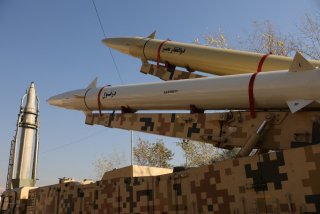Can a Nuclear Deal With Iran Still Be Reached?
If diplomacy cannot get on track soon, and if Iran’s nuclear program continues to accelerate, then the United States should take additional measures to further restrict Iran’s revenue-producing sectors.
Joe Biden has always viewed the security of the United States as the paramount basis of foreign policy and has been prepared to reassess how to advance U.S. interests in light of stubborn new conditions and realities. This pragmatic realism may herald even more important changes in American foreign policy.
Negotiations in Vienna over Iran’s nuclear program started this week. Tehran is striding toward nuclear weapons and has little interest in a diplomatic breakthrough. Meanwhile, the United States still hopes to move forward, State Department spokesman Ned Price said amid efforts to revive a 2015 agreement. "There was some modest progress in the talks. We hope to build on that this week," Price told reporters.
“Sanctions relief and the steps that the United States would take… when it comes to sanctions together with the nuclear steps that Iran would need to take if we were to achieve a mutual return to compliance with the JCPOA [Joint Comprehensive Plan of Action] – that’s really at the heart of the negotiations that are ongoing in Vienna right now." Price said.
Iran has in recent months ramped up its nuclear activity far beyond the constraints of the deal, increasing its stockpile of nuclear material and infrastructure key to building a bomb.
The risk is also that Iranians will look at increasing brinkmanship right now. Iranian decisionmakers may feel that they still have room for their own form of leverage, which is further nuclear escalation, and that as they can continue to spin up more nuclear provocations there is only so much more the United States can do on the sanctions front.
Supreme Leader Ali Khamenei, in reported remarks, ramped up criticism against the “West,” calling them the “enemies” and condemning the U.S. demand for follow-up negotiations as a pretext to walk away from the JCPOA.
“By putting this sentence, they want to provide an excuse for their further interventions on the principle of [the deal] and missile program and regional issues," Khamenei said over the summer, "If Iran refuses to discuss them, they will say that you have violated the agreement and the agreement is over.”
Iranian aspirations for nuclear weapons, if pursued and decisively fulfilled, would pose a grave danger to America’s number one ally in the region, Israel; to the Middle East as a whole, and, possibly, to the United States itself. It would also signal the collapse of the Treaty on the Non-Proliferation of Nuclear Weapons, with all that this entails. It should be noted that Iran’s nuclear aspirations are an integral part of a larger strategy of cultivating asymmetric and strategic anti-American forms of power; it is key to the ideology of the Iranian regime.
A war with Iran would likely destabilize the entire region, especially if Tehran assumes, as it likely might, that Saudi Arabia and Israel’s Abraham Accords partners—Bahrain and the United Arab Emirates—are parties to the Israeli attack. Iran could lash out at all three countries, at which point it would be exceedingly difficult for Washington to stand aloof. Moreover, the Abraham Accords might not survive a regional war, setting back Israel’s hopes for normalizing relations with additional Arab states, especially Saudi Arabia.
There are signs the administration wants to pin the blame on former U.S. president Donald Trump, whose withdrawal from the original nuclear deal supposedly provided Iran with the pretext to advance its nuclear weapons capabilities.
Containing Iran, preventing worst-case outcomes, and stymieing Iranian alternatives to compromise and breaking down barriers within Washington’s own domestic and international coalition would be a way forward. If diplomacy cannot get on track soon, and if Iran’s nuclear program continues to accelerate, then the United States should take additional measures to further restrict Iran’s revenue-producing sectors.
Ahmed Charai is a Publisher of The Jerusalem Strategic Tribune. He is on the board of directors of many Think-Tanks including the Atlantic Council, Center for Strategic and International Studies, International Crisis Group, International Center for Journalists, Foreign Policy Research Institute, and Center for the National Interest.
Image: Reuters.

